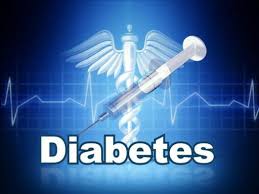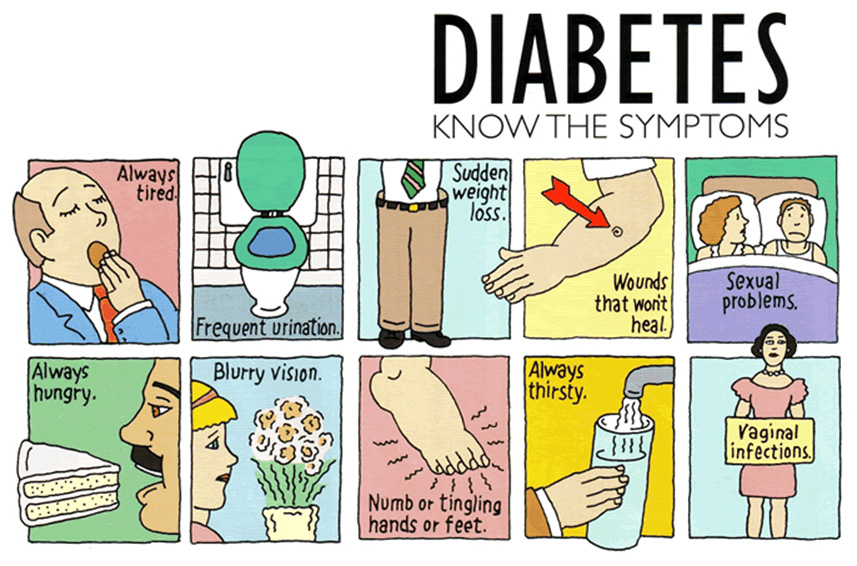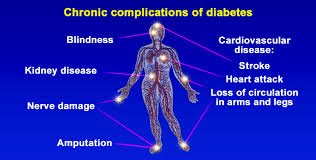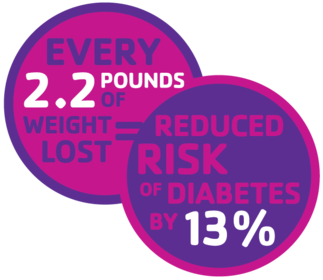Diabetes Mellitus

There are many articles dealing with diabetes which you can easily find by doing an internet search, however, with some of those articles, you need to be a medical doctor or nurse to understand it. I will simplify the literature and provide it to you in plain everyday English that anyone can understand, whether you have a PhD or never finished high school.
My goal here is to provide you with information and insight into the disease so that you will be able to recognize the symptoms in yourself or your loved ones and seek appropriate medical care for diagnosis and treatment.
The Center for Disease Control estimates that in 2012, 11.2 million people 65 years of age and older had diabetes. That translates to about 26% of the elder population. That is not counting the number of people of any age that are living with the condition and don’t even know it because they haven’t been diagnosed.
People may be experiencing some of the symptoms but are blaming those symptoms on age, their stressful job, or a “phase” they’re going through. When they’re tested and are given the diagnosis, it may be a total surprise to them, but then when they learn of the symptoms, they then understand why they have not been feeling well.
There are three types of diabetes but I will be focusing only on Type 2 diabetes which is the most common form and the one that I’ll be writing about here.
Causes of Type 2 Diabetes
Most people would say that the cause of diabetes is having too much sugar in their blood, but they would be wrong. Too much sugar in the blood is a symptom of diabetes, not the cause of it.
The cause is the inability of your body to absorb excess glucose so that it can be utilized as energy. Insulin, a hormone naturally made in your pancreas, allows the cells to absorb glucose, but if your body cannot properly use the insulin it makes, the sugar spills out into your blood. Then when your health care provider checks your blood sugar level and it is high, a diagnosis of diabetes is made.
Some people will tell you that having diabetes is not your fault. They may try to blame genetics or your environment, but they would only be partly correct.
Genetics: We know that we are all different. We inherited our genes from our parents which makes each of us unique with our own set of genes. Hispanic and Blacks have a higher prevalence of diabetes but it is not clear whether that is due to genetics of a combination of factors. But our genes only play a minor part in the development of diabetes. The main culprit is our environment.
Environment: If we consider as our environment, things like: the unhealthy food we have in our pantry, our refrigerator, or the cheeseburger we hold in our hand as we drive to work, then yes, environment is one of the culprits.
If we consider the couch we sit in for hours while we watch TV instead of being active and exercising, then, yes, environment is the culprit.
If we consider the stress of an unhealthy, stressful home life or a stress filled job that we hate to go to every day, then yes, our environment is the culprit.
If we consider the extra weight we carry around our bellies that we have accumulated over the years, then yes, environment is the culprit.
So, you see, there are several factors that play a part in the cause of diabetes, with the main cause of it being our diet.
Symptoms

Symptoms usually develop gradually over a period of years just like our obesity developed over a period of years. We didn’t wake up one morning and found that we gained 200 pounds overnight. It is therefore very important that annual screening be performed, especially if you have a family history of it. But having a family history of diabetes does not by itself mean that you will have diabetes also.
The symptoms of diabetes tend to creep up on you gradually and insidiously so that you may not even notice it until your healthcare provider points it out to you. There are many people in the general population who are going about their daily activities with no idea that they have the disease. they have it until their doctor diagnoses it or they get a finger stick blood sugar check at a health and wellness event and find that their blood sugar is in the 200’s.
These symptoms happen gradually. One day you notice that you’ve been run down lately and that you don’t seem to have the “get up and go” that you usually have. You wonder why and you chalk it up to advancing age. But then you start noticing other symptoms: You are thirsty all the time and you have to get up in the night to go to the bathroom several times. You notice that your skin is dry and itchy and you have a tingling or burning feeling in your legs and feet and cuts that would normally heal in a few days, now take a couple of weeks. Now, you find yourself squinting because your vision is blurry and you think you just need new glasses.
If I just described you in the previous paragraph, it is time to get checked by your primary care physician or health care provider. He/she will run a series of tests to check all the possibilities of why you are having those symptoms.
Although they may point to diabetes, it would be a mistake to make that assumption when there may be other conditions that your body is developing. Your doctor/healthcare provider will be able to do an evaluation and make a diagnosis based on your symptoms, a physical examination and laboratory tests.
Complications

Diabetes is one of the major health problems in the world and yet it does not get the notoriety that it deserves and here's why.
Diabetes can affect almost every organ in your body. It can cause poor blood circulation which in turn leads to damage to your brain, eyes, hearing, heart, pancreas, kidneys, nervous system, and skin.
Let's say you are admitted to the hospital for a stroke. Your diagnosis will be stroke but the underlying reason that you had the stroke was because of your diabetes.
Once you have been diagnosed by your healthcare provider, he/she will prescribe a treatment plan for you. It is imperative that you comply with that treatment plan. Failure to follow your healthcare provider's advice may result in serious complications. Some of the possible complications that could result from your non-compliance:
1. Uncontrolled blood pressure and cholesterol which could lead to heart attack, stroke, poor blood circulation to your legs. Poor circulation contributes to slow healing and infection of wounds which can progress to the point of requiring amputation of toes, feet, or legs.
2. High blood sugar and poor blood circulation also can cause eye problems such as cataracts, sensitivity to light, or even blindness.
3. Poor blood circulation and high blood sugar can also damage your kidneys to the point that they stop working and you may need a kidney transplant of have to undergo hemo-dialysis for the remainder of your life.
4. In men, poor blood circulation can cause nerve damage which could lead to erectile dysfunction.
Prevention

Research shows that losing weight and keeping it off can help delay the onset and progression of pre-diabetes which can lead to type 2 diabetes. The keys to preventing diabetes and its complications include:
1. Eat healthfully,
2. Exercise often
3. Seek out knowledge and support
4. Create an environment that fosters healthful living
5. Learn how to manage your stress
If you've been diagnosed as having diabetes, it is not too late to slow the progression, stop it or as some believe, you can even reverse it. If you have not been diagnosed with it, get started right now on preventing it from ever entering your life.
The key to prevention is in knowing your blood sugar levels and if your blood sugar is on the high side, making the appropriate lifestyle changes. Your healthcare provider is the place to start. He/she can test you and let you know if you if you have diabetes or if you are on your way to developing diabetes.
Exercise
You can no longer be a couch potato. You have to start moving right now. I don't care how old you are, you can do some kind of exercise to burn calories and keep your body active. When I say exercise, I don't necessarily mean going to the gym everyday. You can be and stay active at home with house chores, gardening, chasing after your children/grandchildren, walking your dog, walking with a friend around the block or walking at the mall.
Ninety minutes of exercise six days a week and a steady diet of healthy eating is the best prescription to manage type 2 diabetes without medications.
Healthy Diet

You can no longer go to the "all you can eat" restaurant and stuff yourself to get your money's worth.
One of the biggest problems we have in this country is the fast food industry. It is way too convenient and cheap to just stop by your local fast food chain and order your full meal for a bargain price. You can even biggy size it or, "You want fries with that?"
What most people don't realize is that although the food is cheap, the effects of eating that food will add up to long term health problems that will cost you many times over in doctor visits, medication and hospitalizations.
Because people don't eat the healthy foods that their bodies need, they become deficient in essential minerals and vitamins. The foods that our grandparents ate were fresh foods many times grown in their own gardens. We did not have fast food restaurants and the term had not even been invented yet.
In our fast paced life, it's easy to pull into a fast food restaurant and order a cheeseburger with fries and a large drink. We want something that is quick, easy to eat in our car, is not hard on our pocketbook and that satisfies our appetite. Having to drive to a sit down restaurant where we can have a nutritious stress-free meal just isn't convenient when we're hungry and in a hurry so we pull into the fast food restaurant at the next corner, and so it goes.
Weight Control
Losing even just a few pounds early on when glucose begins to rise can dramatically improve your blood sugar levels, cholesterol levels, triglycerides, blood pressure, and more.
Commitment, perseverance, and a positive
attitude can help you achieve a healthy weight. Set small, achievable goals
first; experience success of meeting those goals; and then add new goals.
Stress Management
I don't think enough attention is given to stress management as a factor in diabetes management.
In people with diabetes, stress can alter blood glucose levels in a number of ways. People under stress may not take good care of themselves. They may drink more alcohol or exercise less. They may forget, or not have time, to check their glucose levels or plan good meals.
When you're stressed, your blood sugar levels rise. Stress hormones like epinephrine and cortisol kick in since one of their major functions is to raise blood sugar to help boost energy when it's needed most. Think of the fight-or-flight response. You can't fight danger when your blood sugar is low, so it rises to help meet the challenge. Both physical and emotional stress can prompt an increase in these hormones, resulting in an increase in sugars.
There are simple ways to manage your stress but one of the most important things you can do it to identify the object of your stress, whether it's your job, your finances, a relationship, an injury or illness. The following are other ways to manage your stress.
· 1. Meditation, yoga, prayer or deep breathing.
· 2. Talk to a therapist of counselor or a member of the clergy.
· 3. Develop an exercise routine and stick with it. Exercise is a good way to relieve stress.
· 4. Eliminate caffeine and reduce alcohol consumption.
· 5. Start a healthy relaxing hobby to occupy your mind. Make sure it is something that you enjoy and keeps you engaged.
· 6. Do not stress eat. Eat a sensible diet of fruits and vegetables with controlled portion sizes.
Today is the first day of the rest of your life. Start today to make healthy living part of your every day. It's all up to you.